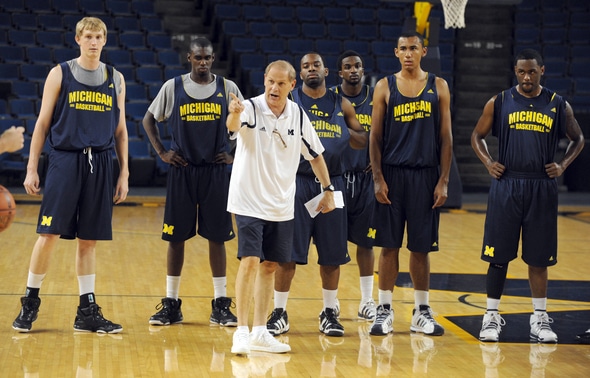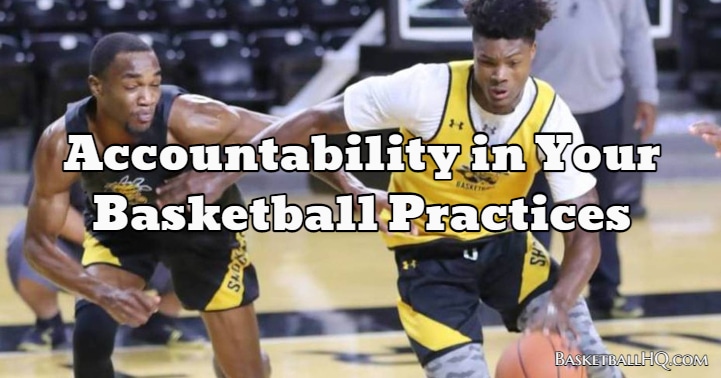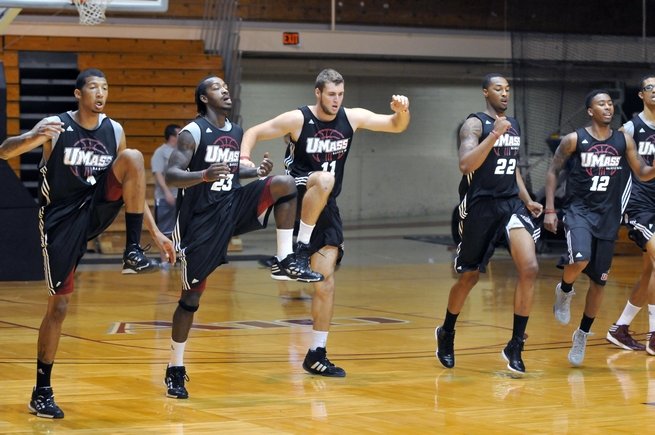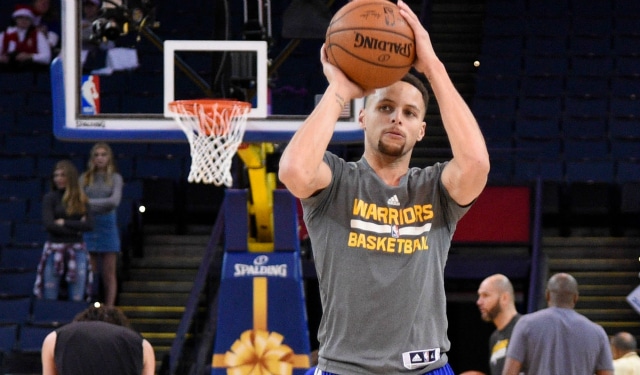
Start getting more out of your basketball practices by taking advantage of these basketball practice resources. Whether you are looking for basketball drills, how to generate more intensity, accountability, etc., this article will have what you need as a coach.
Intensity in Your Basketball Practices

We all expect our basketball teams to play at game speed and compete on every possession in practice. We want our intensity in practice to be up where we know it needs to be to get better and to win games. One of the biggest questions other basketball coaches ask me is, “What do you do to make practice more intense?”
In my opinion, intensity and work ethic can be improved, just like shooting or ball handling. Yes, there are those occasional student-athletes who do not respond, but I have learned a few things that can help make practice more intense.
Some of these strategies we use at Tennessee Tech, and some I have seen used at other schools. In both situations, a coach is a catalyst for raising the intensity in your basketball practices.
Communication in Your Basketball Practices
The number one way to help make basketball practice more intense is improved communication. Basketball teams that communicate trust each other, and teammates that trust each other will play hard for each other.
Kevin Eastman with the Boston Celtics said that communication does these six things for their team:
- Intimidates the other team’s offense
- It gives you a head start at whatever your next movement is (i.e., fighting a screen; early communication allows you to start fighting through a screen before the screener makes contact)
- The man guarding the ball has much more confidence
- Wakes up a disengaged defense
- Catches mistakes before they are made
- Energizes the team (our best practice are our loudest practice)
This includes demanding that your players become coaches from the sideline. For instance, if your team is working on a standard shell basketball drill, have the players waiting in line communicate to the player on defense.
One of the biggest questions I get from our guys on communication is, “What do you want me to say?” Assign them specific roles and a vocabulary to use, and hold them accountable. The players in the lines will grasp the concept sooner if they are coaching those in front of them.
Basketball Drill Variation in Practice
Using a variety of basketball drills can also help make practice more intense. Players get bored doing the same drills; sometimes, making one little adjustment to a drill can help ignite that segment of practice. For instance, say your team does a three-man weave every day for three minutes. The next time you do that basketball drill, give them a goal of made layups without a miss. This will help to keep them focused and also promote accountability in your basketball practice, and with your team.
Competition Level in Basketball Practice
Competition instinctively promotes an intense practice. Like Herm Edwards said, “We play to win the game.” Every drill should have a winner and a loser, including a consequence for the losing team. We started this at Tennessee Tech, and it’s amazing how much harder kids will play when something is at stake.
However, the consequence must mean something. For instance, losing a competition basketball drill and running a down and back will not really affect players. On the other hand, losing and running a timed suicide is much more difficult. The suicide is harder and only takes roughly 30 seconds, so it does not cut into practice time.
Go-To Basketball Drill
When practice does seem to lag or become dull, have a “go-to” basketball drill to run. Most teams have basketball plays that they will run when they know they need a bucket. Practice should be the same way. Implement a team basketball drill that you know can help your players get back on track when practice seems monotonous.
Timed Basketball Practice
When I coached basketball at Lee University, we had two clocks set up for practice. One had the total time left in practice, and one had the total time left in that drill. One positive our team gained from this was knowing exactly how long they had to practice. They were intense for that specific amount of time. There are pros and cons to this idea, but it is an alternative method that helps to generate pressure and intensity in practice.
Your Level of Coaching Intensity
The final way to facilitate a more intense practice falls on the shoulders of the coaches. Basketball coaches themselves play a role in keeping practice intense. It is a coach’s responsibility to strategically plan out a practice that promotes all of the stated techniques and be intense themselves. Players love when coaches sweat with them. How can a player not give their all when their coach is?
I firmly believe that basketball teams take on the personality of their head coach. If you want more intense practice, learn to become more intense during practice. These ideas are a collaboration of many people’s beliefs. Again, some of these we implement at Tennessee Tech and others we do not.
A coach must still teach and coach to his personality, but I hope that the ideas in the basketball coaching article are helpful.
Accountability in Your Basketball Practices

Kyle Getter contributed to this portion of the article.
As basketball coaches, we all want to hold our players accountable in practice and games, both defensively and offensively. There is an old saying that “you play as you practice.” Therefore we are constantly working on developing good habits every day in basketball practice so that they will carry over to us executing in the game.
This leads to the question of how do you work toward developing these habits consistently? In my experience, it often is not enough to tell a guy to stop turning the ball over or to stop allowing the middle drive in practice. You have to put something on it.
There must be consequences if they fail to do what you demand. Whether it is running sprints, pushing a sled, or a point competition, there must be consequences to not executing.
To help build our habits consistently, we started having a practice long competition called “50/50.” Mike Jones, our Head Coach at Radford University, came up with the basketball drill, and since we have implemented it into our practices, we have seen our execution improve.
We have found that this method of accountability works better because peer pressure comes into play. Each individual’s actions affect the entire basketball team, and everyone is paying for mistakes, not just the person committing the mistakes.
Here is how the drill works. You have 2 teams and start the competition with each team having 50 points. Then throughout practice, every live drill will be scored based on the “50/50” scoring system. All point totals can be more or less points, and categories can change depending on what you want to emphasize with your basketball team that particular day.
It is a running score, and at the end of practice, the losing team owes running sprints. We usually have 3 down and back sprints (9 seconds each) and a 30-second sprint (foul line, ½ ct, opposite foul line, and full-court) as the penalty for losing. Below is an example of our “50/50” scoring system.
Offensive Points
- Off. Reb = +2
- 2/3 = +2/+3
- Perfect Execution = +2
- No Execution = -3
- Turnover = -5
- No Talk = -2
- Common Foul = +1
- Shooting Foul = +2/+3
Defensive Points
- Deflection = +2
- Charge = +5
- Middle Drive = -3
- Show N Go = +2
- Launching Pad and Seal Down = +4
- No Talk = -5
- Team Block-Out = +2
Basketball Practice Drills

When the basketball season is fully underway, and there are multiple games each week, there are only so many hours of practice time available for your team. With these limited hours, you have to find time to work on all of the different upcoming game plans, basketball plays, etc., and sometimes team skill development falls to the wayside.
During the season, though, it matters the most for your players to be playing their best, and you must find the right basketball practice drills to help your players be at their best and leave time for team strategy and improvement. This skill development basketball coaching article will provide you with some excellent tips and basketball practice drills that you can use with your team.
Tips for Basketball Practice Drills
Maximize Your Drill Time
You don’t have to spend a lot of time doing basketball drills during your practices, usually 15-20 minutes should be enough. A big point, though, is making sure that all of your players are involved during the drills and that they are going at game speed. If most of your players are standing around while only 1-2 players are actively participating in the drill, it is no good.
Use Stations to Work on Specific Basketball Skills
Not every drill is going to benefit each of your players the same way. For example, post-move basketball drills aren’t going to benefit your point guards the same way that it would your post players. That is why you should try to do stations if you can or break your team up between posts and guards. This way, your players will be able to work on skills that are specific to their position.
Game Situation Basketball Drills
A great way to maximize time in your basketball practices and help your team improve is to do game situation drills to cover a specific action that you will use within your team’s offense. If your team uses a lot of ball screens within your offense, you may want to spend time going over using a ball screen, the different reads, and then let them get a lot of repetitions using it.
For this type of basketball drill, you could involve the posts and guards because they are both involved in the action and will be able to work on their specific part of the action.
Team Ball Screen Basketball Drill
Have your line of guards start on the wing, just above the free-throw line extended, each player with a ball (or at least the first couple). The post players are going to start on the opposite block. Finally, there will be a coach at the top of the key who will be the passer.
When the drill starts, the first post player will sprint up and set a screen for the first wing player in line (slightly round the angle to the screen). The wing player will come off the ball screen and shoot, drive, or pass it to the spacing/rolling post player. After the wing player makes his move, the coach will pass to whichever player didn’t end up shooting the basketball. Both players will get their own rebound, and then the next players in line will go.
*The coach can predetermine what type of screen it is and whether the post player rolls or spaces after the screen. The team can also be broken up into two groups to get more repetitions (opposite ends of the court).
Game Speed and Intensity When Doing Basketball Drills
Whether it is doing basketball dribbling drills, basketball shooting drills, or whatever. You need to make sure that the drill is being done at game speed and with game intensity. Don’t let your team waste valuable time by only going half-speed or goofing around during the drills. Remind them that they could be doing something else less enjoyable with this practice time, and if they are not going to go full speed, you will move onto something else.
Basketball Practice Drills Conclusion
Hopefully, you can now see the value of making sure that you are doing basketball skill development in your practices and ways to weave them seamlessly into your existing practices. Remember, they don’t have to be done for very long, and the time you give up will really help your players keep their skills sharp in season. Basketball practice drills are also a great way to break up your practices to help keep your players mentally engaged and motivated.
Generating Pressure and Intensity in Basketball Practice

The reason that we practice is to prepare for our basketball games and also to give our teams the best chance to win those games. This means that we should be doing our best to make practice as game-like as possible and generate as much game pressure and intensity with our players as we can.
By doing this, you will help your players experience some of the different game pressures that they will face in a game. They will learn to deal with adversity, make shots under pressure, work on end of game situations, etc. So how can you, as a basketball coach, help generate pressure and intensity in your basketball practices?
There isn’t a way that you can mimic the pressure of a real basketball game completely, but there are ways to come close to it. The closer that you can get your basketball practices to being game-like, the more you will be prepared for your games. So here are some tools that you can use as a coach to make sure that you are doing everything you can to help promote a game-like feel in your basketball practices.
Establish Your Basketball Culture
The first thing you need to do with your basketball team is to develop what you expect from them during practice time. Explain to your players why it is important, what will be required of them, and then hold every player in your basketball program accountable.
It will be hard at first, but you will find that the players will begin holding themselves accountable once the team culture starts to build. This is when your basketball practices start to get exciting, and you start seeing real growth in your team.
A great way to help speed this process up is to go to your player leaders and ask them to help you make sure that practice is on an elite level.
Let them know that it is essential to having a successful basketball season, and then teach them how to be player leaders. You must have players that are willing to step up and set the tone in practice, and it doesn’t always have to be your most skilled players either.
End of Game Situations
A great way to put pressure on your players is to set up end-of-game situations. Have your basketball team play a two-minute game, start one of the teams down by 5 points, or whatever type of situation you want to work on. Use situations that they will experience in games throughout the season to help them prepare and put added pressure on them.
This will also help your players understand how much time they actually have at the end of a game and will help them execute the game plan in a pressure situation and succeed. Game pressure will always be there, but you can teach your basketball team not to allow it to impact them negatively.
Competition in Practice
A big part of having intensity in basketball practice is having a healthy competition between your players. Every day your players should be challenging each other in practice for playing time, roles on the team, shots, etc., because nothing helps a team grow like healthy competition.
A great way to promote competition in your practices is to do basketball competition drills with a limited number of players on the floor (1 on 1, 2 on 2, etc.). Playing 5 on 5 is great, and there are a lot of things that can be worked on, but it also allows players to hide and be complacent.
A 2-on-2 rebounding basketball drill or a 1-on-1 offensive/defensive basketball drill will force players to compete, or they are going to get exposed.
It is up to you as to what you want to work on in these small group segments. It can even be breaking down a certain portion of your team’s offense or defensive scheme.
However, I would recommend that this be done towards the beginning of your basketball practice; that way, you can set a competitive tone early. It doesn’t have to be done for very long; 10-15 minutes should be plenty of time.
Hate to Lose
Losing should not be comfortable for your basketball team. Every player on your team needs to hate losing. Whether it is a basketball shooting drill or a 5-on-5 short game in practice, there needs to be that hate for losing. Instill in your players the idea of never wanting to lose and giving their best effort in everything that they do.
One of the best ways to help promote this is by having consequences for the team that losses a team basketball drill or short game in practice. It could be some form of running, push-ups, etc., but establish the consequence before the game or basketball drill starts, and you will help your players to play harder and learn to play with pressure. It has to hurt to lose.
Generating Pressure and Intensity in Basketball Practice Conclusion
At the end of the day, you are going to play the same way that you prepare. So if your basketball practices are full of energy, players are being held accountable, and you are preparing at a high-level, your gameplay will reflect this. Unfortunately, though, this does not just happen naturally. It takes a conscious effort by everyone involved to ensure that practice is being executed at a high-level.
So take advantage of this basketball coaching article and these different ways to generate pressure and intensity in your basketball practices and start setting yourself up for success no matter what situation you experience in a game throughout the season.
Post Practice Basketball Shooting Drills
Russ Willemsen contributed to this portion of the article.
We all want to knock down shots in a game, but do you really understand how hard it is to become a great shooter in basketball? It is a simple concept but difficult to understand: REPS…and not just reps, but reps at game speed. We charted the number of shots one of our players took in a particular basketball practice.
This included layups in 3 man weave, shots during a water break, 5 on 0 offense, and basketball drills with defense. He took 54 shots that entire practice. There is no way one can become a consistent shooter taking just 54 shots every day. That means that it is up to you to be responsible and get shots up on your own after practice.
Here are four post-practice basketball shooting drills to improve your team’s shooting percentages.
5 Minute Basketball Shooting Drill
This basketball shooting drill requires one shooter, one passer/rebounder, and one ball. The shooter will attempt catch and shoot three-pointers for five straight minutes from various spots on the court. We like for our right-handed players to have their left foot down and step into their shot (opposite for lefties) and have their hands ready.
At the end of the five minutes, the shooter should have attempted between 70-90 three-pointers, depending on long rebounds, etc. Our goal is for our basketball player to be above 50 makes in those five minutes, and great shooters should be above 60 makes, and elite shooters are above 70 makes.
Vanderbilt Basketball Shooting Drill
I attended a basketball coaching clinic at Vanderbilt and stole this drill from them. This basketball shooting drill requires one shooter, one passer/rebounder, and one ball. The shooter will pick a three-point spot to begin shooting from. Once he declares that spot, he cannot move until he makes three FGs in a row.
After the shooter makes three in a row, he moves to the next spot. The objective is to count how many spots of three in a row one can make in five minutes. Vanderbilt said their high was John Jenkins that made 21 spots of three 3FGs in a row in a five-minute period. This is a great basketball drill that also adds pressure to shooting.
5 Spots, 10 Shots, Repeat Basketball Shooting Drill
This basketball shooting drill requires one passer, one rebounder, and two balls. The shooter will attempt 10 catch and shoot three-point field goals from the left corner, left-wing, top of the key, right-wing, and right corner. The shooter will take five free throws and repeat the catch and shoot three-pointers.
This will give the shooter 100 3FGA. We want our shooters to knock down 70 out of 100 on catch and shoot with no defense in basketball shooting drills. Anything above 80 is an elite shooter. This drill should take no longer than 10 minutes, including the free throws.
Spurs Basketball Shooting Drill
This basketball shooting drill is a bit more complicated but great for getting game shots. I modified the drill to fit our system to ensure the shots attempted are out of our offense. The drill requires one shooter, one passer/rebounder, and one ball. It is also a great conditioning basketball drill that adds fatigue to the shooter.
This drill should take no more than 10 minutes., and the shooter will take the following shots
- 25 Catch and shoot mid-range shots (5 shots each from the left corner, left-wing, top of the key, right corner, right-wing)
- 5 shots moving from left wing to left corner
- 5 shots moving from the left corner to left-wing
- 5 shots moving left wing to the top of the key
- 5 shots moving from the top of the key to left-wing
- 5 catch and shoot left-wing transition 3FGs. Start at half court and sprint to the left-wing
- 5 transition ball screen 3FGs from the left-wing. Start at half court dribble down to a wing ball screen, and shoot the 3FG.
- 5 screen the screener 3FGs. Start on the right block and set a cross-screen on the left block. Come up the left lane line for a top of the key 3FG
- Repeat steps 2-8 on the right side
- 5 Catch and shoot 3FGs (1 shot each from the left corner, left-wing, top of the key, right corner, right-wing)
Post-Practice Basketball Shooting Drills Conclusion
Becoming a better shooter in basketball will not happen overnight. It takes time and work. One of these basketball shooting drills a day will make a world of difference. You will not only see your numbers increase but also the confidence in which your players shoot the basketball. Also, with multiple baskets and multiple basketball rebounders, you can have a large number of players working on their shooting after practice.




